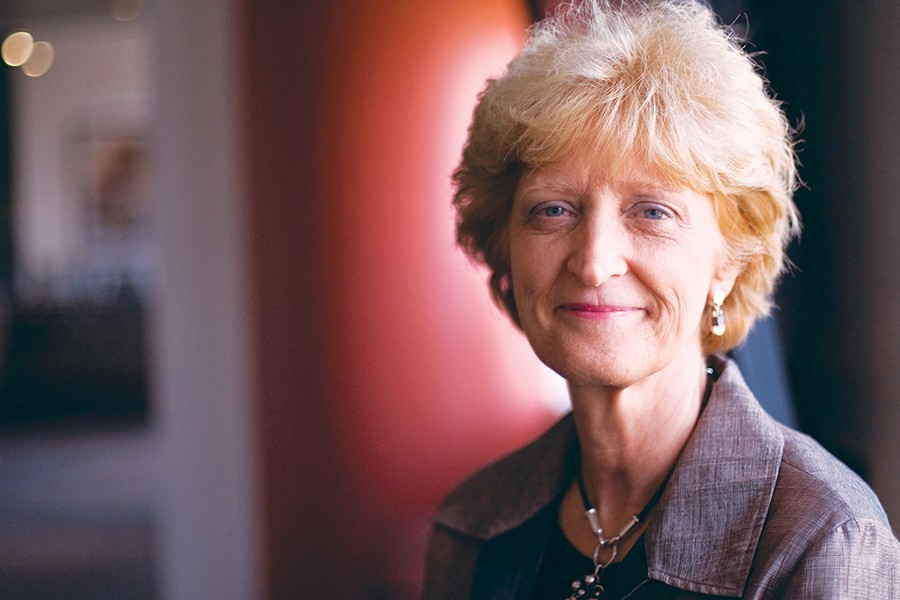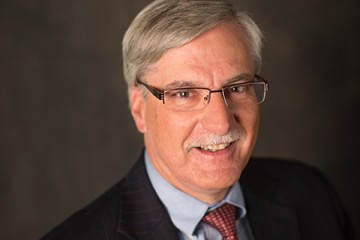A century after Johns Hopkins University created a new type of school to save lives hundreds, thousands, or even millions at a time, that mission has not changed, says the incoming dean of the Bloomberg School of Public Health.
Neither has the school's culture, says the new dean, longtime faculty member Ellen J. MacKenzie.
"One thing that has always impressed me about the school is how proud both faculty and staff are to be part of the whole and how committed folks are toward achieving our collective mission," MacKenzie says. "It is a great place to work because you feel you can, and will, make a difference."
What has changed, though, is "the way we go about meeting the mission," adds MacKenzie, whose appointment as the school's 11th dean was announced today.
Some of the changes are readily apparent. Online teaching and open courseware deliver Bloomberg School expertise directly to students on the front lines of public health around the world. Experiential learning and case-based approaches are more and more a part of the on-campus curriculum.
An explosion in available data and data technology has created enormous opportunities for both research and patient care, MacKenzie says. Interdisciplinary and systems-oriented approaches to problems are more critical than ever.
"BSPH has been a leader in these areas, but we must continue to innovate," MacKenzie says, "or we will quickly fall behind and fail our students and the global public health community more broadly."
MacKenzie—an expert on improving trauma care systems and policy, a nationally renowned researcher, and a veteran academic leader—will assume her new role as dean on Oct. 1.
She was chair of the Bloomberg School's Department of Health Policy and Management from 2005 until last year and was recently appointed the university's 30th Bloomberg Distinguished Professor.
"I have been deeply impressed by Dr. MacKenzie's appreciation for today's global and local public health challenges, and by her visionary understanding of the Bloomberg School's role as a leader in confronting these challenges," says Ronald J. Daniels, president of the university. "Her renowned scholarship, proven academic leadership, and tireless commitment to the mission of Johns Hopkins make her ideally suited to serve as the next Bloomberg School dean."
MacKenzie will lead the world's first and largest school of public health, the same school where she earned her Master of Science in biostatistics in 1975 and completed her PhD in 1979. She then joined the faculty, rising to full professor in 1991.
"My love for the field of public health and the school started as a graduate student in biostatistics, and I have never looked back," MacKenzie says.
Her career spent researching the short- and long-term consequences of traumatic injuries has been critical to improving the organization and performance of trauma care systems and to achieving better patient outcomes. MacKenzie heads a national research consortium that pairs more than 50 major U.S. trauma centers with top military medical facilities. The relationships allow the centers to share information and best practices, benefiting both wounded combat veterans and civilian trauma patients.
The Bloomberg School, founded in 1916 by Johns Hopkins physician William H. Welch and philanthropist John D. Rockefeller, comprises 10 departments and more than 60 focused centers and institutes. Its nearly 1,400 faculty members are experts in fields ranging from basic sciences like molecular microbiology, to public health tools like biostatistics and epidemiology, to issues like international health, mental health, health-related behavior, and environmental health.
The school conducts research in more than 130 countries and offers master's and doctoral degrees to more than 2,200 students from more than 75 nations.
MacKenzie says one of her top priorities will be to ensure success for the school's Bloomberg American Health Initiative. It's a broad $300 million effort—funded by Johns Hopkins alumnus, former New York City mayor and philanthropist Michael R. Bloomberg—to mitigate five critical threats to U.S. health: drug addiction, obesity, gun violence, adolescent health concerns, and environmental challenges.
"Michael Bloomberg has given the school and the university an unprecedented opportunity to tackle some of the major public health problems of the 21st century," she says, "and transform the way we think about public health and engage in our communities.
"We need to succeed at this," MacKenzie adds. "American lives depend on it."
MacKenzie will succeed Michael J. Klag, dean of the Bloomberg School since 2005 and the longest-serving of the university's current school leaders. Klag, an expert on the epidemiology of major chronic diseases, announced in October that he would step down to resume research and teaching.
"Mike Klag has been the heart and soul of the school over the past 12 years, and for that we are all so grateful," MacKenzie says of her predecessor. "His open leadership, good humor, and remarkable commitment to public health and the school have made a lasting difference."
Posted in News+Info
Tagged ellen mackenzie










